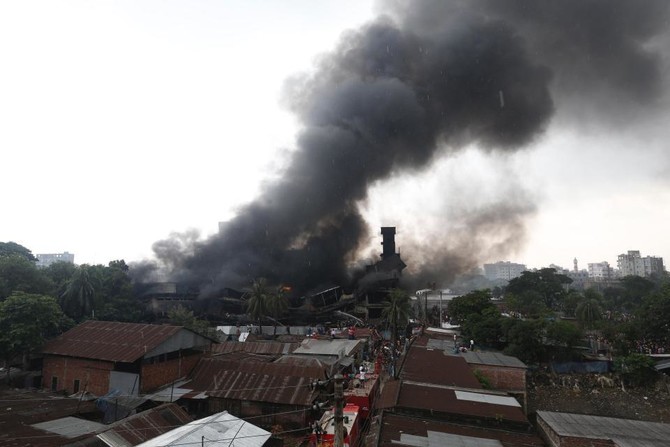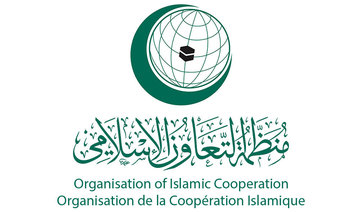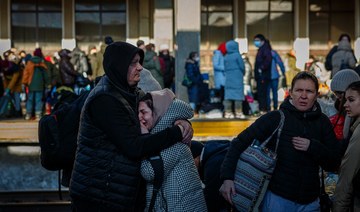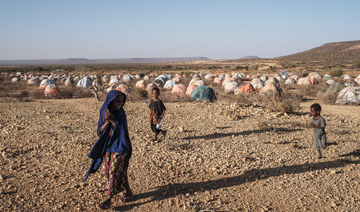DHAKA: Bangladesh’s government is taking a number of initiatives to improve the country’s air quality.
On Jan. 30, the capital Dhaka was ranked on the Air Quality Index (AQI) as having the worst air pollution in the world.
“We’re planning a number of initiatives to upgrade the AQI of the city,” Dr. Monjurul Hannan of the Department of Environment told Arab News.
Brick kilns in Dhaka’s vicinity are “responsible for 52 percent of the pollution” in the area, and the government is urging owners of these kilns to “use efficient and sustainable energy,” he said.
“Around 60 percent of the brick kilns have switched to efficient energy sources. We’re monitoring them closely so the rest will do the same. We’re also discouraging unregistered brick kilns from operating in the area.”
Over the years, air quality in Bangladesh has declined at an alarming rate, particularly during winter. The AQI’s real-time map shows that Dhaka’s air quality is “extremely unhealthy.”
The US Environmental Protection Agency (EPA) developed the AQI, which is divided into six categories indicating levels of concern over health.
A value of more than 300 represents hazardous air quality, and below 50 indicates that it is good. Dhaka consistently ranks between 301 and 500.
“Dhaka is one of most populated and polluted cities in the world, and it’s becoming more polluted every day,” Dr. Atik Rahman, a renowned environmentalist and 2007 Nobel Peace Prize laureate, told Arab News.
“Numerous brick kilns around the city are producing huge levels of dust and smoke. Garment and leather factories in and around the city, and other industries on the outskirts, are also adding to the level of pollution,” said Rahman, who is executive director of the Bangladesh Center for Advanced Studies.
“In addition, we have many high-rise buildings under construction, and these construction sites are seriously adding to air pollution.”
Hannan said: “Dhaka faces the highest level of air pollution during winter, since we don’t get much rain then.”
He added: “Under-construction buildings and roads are adding more dust to the environment, making the situation even worse.
“Private construction operators must strictly maintain the (government’s) building code and carry material more carefully so as to avoid more dust.”
Five of the top 10 causes of death in Bangladesh are related to air pollution, according to the World Health Organization (WHO).
Rahman said: “At present, the people of Dhaka are suffering from respiratory problems and various lung-related diseases due to inhaling polluted air every day.”
He added: “We need to decrease the population pressure on this city, otherwise there will be no sustainable solution to this air pollution.
“We also need to improve the urban traffic system and make it more efficient, as traffic jams result in burning fuel inefficiently, adding more and more particulate matter 2.5 in the air, which is highly injurious to health when inhaled.”
Bangladesh takes steps to improve air quality
Bangladesh takes steps to improve air quality

Haldiram’s: India’s beloved snack maker eyed by foreign investors Blackstone, UAE wealth fund

- Haldiram’s started in 1937 from “tiny shop” in Bikaner in desert state of Rajasthan
- Haldiram’s has almost a 13% share of India’s $6.2 billion savoury snacks market
From fried Indian snacks to local sweet delicacies, family-run Indian snack maker Haldiram’s has long been one of the country’s most popular food brands. Now, foreign investors like Blackstone and Abu Dhabi Investment Authority want a big bite of it.
Haldiram’s was last year also an acquisition target for India’s Tata Group, one of the country’s biggest conglomerates.
Here are some facts about the popular Indian brand:
* Haldiram’s started in 1937 from a “tiny shop” in Bikaner in the western desert state of Rajasthan. It later expanded to New Delhi in 1983.
* The company’s website says it has 1,000 distributors and its products are available in 7 million outlets. It also exports to many foreign countries including Japan, Russia, United Kingdom and Australia.
* One of its most popular snacks is “bhujia,” a crispy fried Indian snack made with flour, herbs and spices and sold for as little as 10 rupees (12 US cents) across mom-and-pop stores. Haldiram’s calls it “an irresistible Indian snack” which can “captivate your taste buds.”
* Haldiram’s started exporting products in 1993. The US was its first market, where it began with 15 savoury products, and later, in 2016, opened its first overseas factory in the UK.
* Beyond snacks, Haldiram’s also sells ready-to-eat and frozen foods such as Indian curries and rice items. It also runs more than 150 restaurants which sell street-style Indian food, as well as Chinese and western cuisine.
* Last year, during deal talks with Tata, Haldiram’s was seeking a $10 billion valuation. Reuters has previously reported Haldiram’s annual revenues are around $1.5 billion.
* Haldiram’s has almost a 13% share of India’s $6.2 billion savoury snacks market, Euromonitor International estimates.
($1 = 83.5200 Indian rupees)
Internally displaced people reached 76 million in 2023 – monitoring group

- Almost 90 percent of the total displacement was attributed to conflict and violence
- The group reported a total of 3.4 million movements within Gaza in the last quarter of 2023
GENEVA: Conflicts and natural disasters left a record nearly 76 million people displaced within their countries last year, with violence in Sudan, Congo and the Middle East driving two-thirds of new movement, a top migration monitoring group said Tuesday.
The Internal Displacement Monitoring Center report found that the number of internally displaced people, or IDPs, has jumped by 50 percent over the past five years and roughly doubled in the past decade. It doesn’t cover refugees — displaced people who fled to another country.
The report tracks two major sets of information. It counted 46.9 million physical movements of people in 2023 — sometimes more than once. In most of those cases, such as after natural disasters like floods, people eventually return home.
It also compiles the cumulative number of people who were living away from their homes in 2023, including those still displaced from previous years. Some 75.9 million people were living in internal displacement at the end of last year, the report said, with half of those in sub-Saharan African countries.
Almost 90 percent of the total displacement was attributed to conflict and violence, while some 10 percent stemmed from the impact of natural disasters.
The displacement of more than 9 million people in Sudan at the end of 2023 was a record for a single country since the center started tracking such figures 16 years ago.
That was an increase of nearly 6 million from the end of 2022. Sudan’s conflict erupted in April 2023 as soaring tensions between the leaders of the military and the rival Rapid Support Forces broke out into open fighting across the country.
The group reported a total of 3.4 million movements within Gaza in the last quarter of 2023 amid the Israeli military response to the Oct. 7 attacks in Israel. That means that many people moved more than once within the territory of some 2.2 million. At the end of the year, 1.7 million people were displaced in Gaza.
Group director Alexandra Bilak said the millions of people forced to flee in 2023 were the “tip of the iceberg,” on top of tens of millions displaced from earlier and continuing conflicts, violence and disasters.
The figures offer a different window into the impact of conflict, climate change and other factors on human movement. The UN refugee agency monitors displacement across borders but not within countries, while the UN migration agency tracks all movements of people, including for economic or lifestyle reasons.
Pakistan PM unveils broader plan to sell most state-owned firms

- Announcement comes amid talks on new IMF loan
- There can’t be any strategic commercial SOEs, says ex-minister
ISLAMABAD: Pakistan will privatise all state-owned enterprises, with the exception of strategic entities, Prime Minister Shehbaz Sharif said on Tuesday, broadening its initial plans to sell only loss-making state firms to shore up its shaky finances.
The announcement came after Sharif headed a review meeting of the privatization process of loss-making state enterprises (SOEs), according to a statement from his office, which discussed a roadmap for privatization from 2024 to 2029.
“All of the state-owned enterprises will be privatised whether they are in profit or in losses,” Sharif said, adding that offloading the SOEs will save taxpayers’ money.
The statement didn’t clarify which sectors would be deemed strategic and non-strategic.
The announcement came a day after an International Monetary Fund (IMF) mission opened talks in Islamabad for a new long-term Extended Fund Facility (EFF), following Pakistan’s completion of a $3 billion standby arrangement last month, which had averted a sovereign debt default last summer.
Privatization of loss-making SOEs has long been on the IMF’s list of recommendations for Pakistan, which is struggling with a high fiscal shortfall and a huge external financing gap. Foreign exchange reserves are hardly enough to meet up to a couple of months of controlled imports.
The IMF says SOEs in Pakistan hold sizable assets inn comparison with most Middle East countries, at 44 percent of GDP in 2019, yet their share of employment in the economy is relatively low. The Fund estimates almost half of the SOEs operated at a loss in 2019.
Patchy success so far
Past privatization drives have been patchy, mainly due to a lack of political will, market watchers say.
Any organization that is involved in purely commercial work can’t be strategic by its very nature, which means there can’t be any strategic commercial SOEs, former Privatization Minister Fawad Hasan Fawad told Reuters on Tuesday.
“So to me there are really no strategic SOEs,” he said.
“The sooner we get rid of them the better. But this isn’t the first time we have heard a PM say this and this may not be the last till these words are translated into a strategic action plan and implemented.”
Islamabad has for years been pumping billions of dollars into cash-bleeding SOEs to keep them afloat, including one of the largest loss-making enterprises
Pakistan International Airline, which is in its final phase of being sold off, with a deadline
later this week to seek expressions of interest from potential buyers.
The pre-qualification process for PIA’s selloff will be completed by end-May, the privatization ministry told Tuesday’s meeting, adding discussions were underway to sell the airline-owned Roosevelt Hotel in New York.
It also said a government-to-government transaction on First Women Bank Ltd. was being discussed with the United Arab Emirates, and added that power distribution companies had also been included in the privatization plan for 2024-2029.
“The loss-making SOEs should be privatised on a priority basis,” Sharif said.
Russian president Putin to make a state visit to China this week

- The Kremlin in a statement confirmed the trip and said Putin was going on Xi’s invitation
BEIJING: Russian President Vladimir Putin will make a two-day state visit to China this week, the Chinese Foreign Ministry said Tuesday.
Putin will meet Chinese leader Xi Jinping during his visit starting on Thurday, it said.
The Kremlin in a statement confirmed the trip and said Putin was going on Xi’s invitation. It said that this will be Putin’s first foreign trip since he was sworn in as president and began his fifth term in office.
The two continent-sized authoritarian states, increasingly in dispute with democracies and NATO, seek to gain influence in Africa, the Middle East and South America. China has backed Russia’s claim that President Vladimir Putin launched his assault on Ukraine in 2022 because of Western provocations, without producing any solid evidence.
Pro-Palestinian protesters cleared from Geneva university

- Geneva university officials had asked the protesters on Monday to vacate the premises and protest in a different manner.
About 20 officers entered the UniMail building around 0300 GMT, a journalist from the Keystone-ATS news agency said.
“Most of the students were sleeping. After being gathered they were led to the underground parking garage,” Julie Zaugg, a journalist with LemanbleuTV channel, said on X.
She said they shouted pro-Palestinian slogans before being handcuffed and taken away in vans.
Geneva university officials had asked the protesters on Monday to vacate the premises and protest in a different manner.
Students demonstrations have gathered pace across Western Europe in recent weeks with protesters demanding an end to the Gaza bloodshed and to cut ties with Israel, taking their cue from demonstrations that have swept US campuses.
There have been similar protests in other Swiss universities and polytechnic schools including Lausanne, Berne, Basel and Zurich.
The bloodiest ever Gaza war began with Hamas’s October 7 attack on Israel, which resulted in the deaths of more than 1,170 people, mostly civilians, according to an AFP tally based on Israeli official figures.
Militants also seized hostages, of whom Israel estimates 128 remain in Gaza, including 36 the military says are dead.
Israel’s bombardment and offensive in Gaza have killed at least 35,091 people, mostly women and children, according to the health ministry in the Hamas-run territory.

















